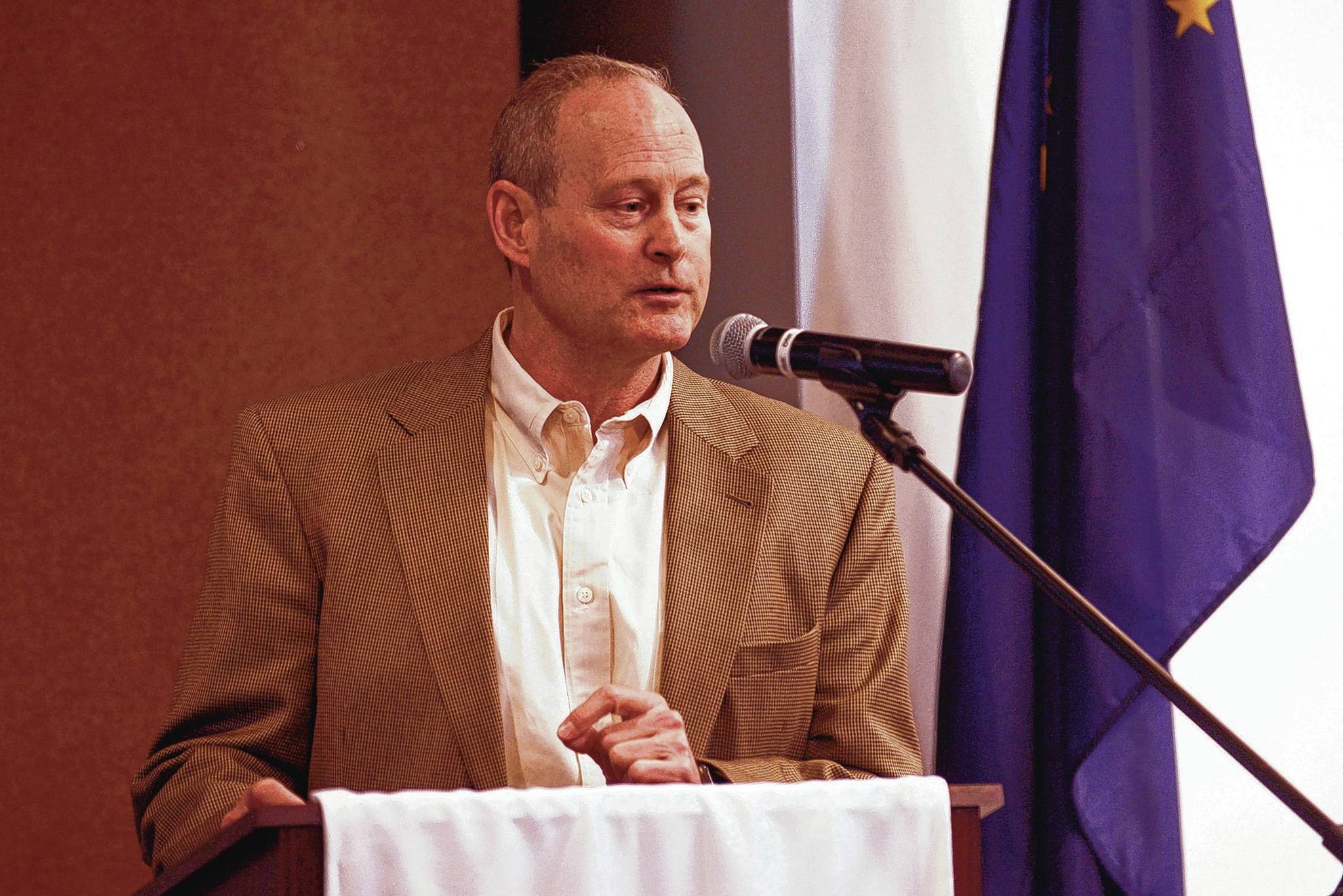Under Alaska’s current oil tax and incentive program, the state “is really a co-investor” in oil and gas development, according to Pat Foley, Senior Vice President of Alaska Operations for North Slope oil producer Caelus Energy.
Foley spoke Wednesday in Kenai about his company’s plans and their relation to Alaska’s tax policy and fiscal problem — which he said is “really an oil production problem on the North Slope.”
Foley had previously been president of oil producer Pioneer Natural Resources Alaska from May 2013 until Pioneer sold its Alaska subsidiary to privately-held Caelus in October of that year. On Wednesday, he gave his Kenai Chamber of Commerce audience a pitch similar to what prospective investors might hear: portraying Caelus’ assets — particularly its 2016 announcement of a possible 6 billion barrels of recoverable oil at Smith Bay, a North Slope inlet nearly 120 miles from existing oil infrastructure — as potential pillars of a renewed oil-funded state.
In addition to Smith Bay, Caelus’ assets are the 15,000 barrel-a-day Oooguruk site and the estimated 150 million-barrel reserve of the nearby Nuna site, which Foley said would require about $1 billion investment to develop and is currently “on the shelf” due to low oil prices and uncertainty over state tax policy.
In Foley’s talk, these took a backseat to Smith Bay, a discovery that he said “we’ve been traveling around the state trying to celebrate with the oil community.” The celebration is somewhat tempered by the difficulties Foley outlined in extracting the Smith Bay oil and bringing it to the intake of the TransAlaska Pipeline at Prudhoe Bay.
The field has thus far been probed by two assessment wells. Further development, however, will have to confront the obstacles of the field’s geology and its distance from established infrastructure.
First, the oil lies in a “tight” reservoir — one in which the mircoscopic oil-containing pores in the rock have little connection to one another — that may require hydraulic fracturing, commonly known as “fracking,” to extract. A third appraisal well to be drilled next winter, will be fractured in preparation. The low viscosity of the Smith Bay oil may be one advantage for extraction, Foley said.
Foley estimated developing Smith Bay would take about $10 billion — roughly $7 billion for drilling and $3 billion for facilities. In the latter category, transportation issues may be the biggest difficulty, and the hardest expense, in developing Smith Bay.
“For any company, especially a tiny company like Caelus, we are a very capital-limited company,” Foley said. “So any help we could get with our facility investment goes a long away. A project like this would benefit greatly from a road. … And there would be a common-carrier pipeline that would evacuate the sales-quality oil. So those are two elements — a road and a pipeline — where someone else could make the investment. The state of Alaska, the Alaska regional corporations, a private entity. A company like Caelus could pay a fee or a tarrif to utilize those services. One of the requests we have for Alaska is a stable tax policy, but also, what facilities can you or the federal government make to open up these resources?”
In the most optimistic scenario, Foley said Smith Bay could begin delivering oil to the Trans-Alaska Pipeline in 2023. The field would have about a 40-year life, he said.
Foley has previously described Alaskans as co-investors in Caelus’ projects, including at a June 2015 joint hearing of the House and Senate Resource committees, at which he stated that his company had received about $300 million in tax credits since 2002. According to a March 2017 Bloomberg profile, Caelus had $100 million in tax credits suspended when Alaska Governor Bill Walker vetoed payments for credits in 2016.
Foley is also a board member of the Alaska Oil and Gas Association, a trade group that has advocated for Alaska’s present tax and incentive regime, created in 2013 by Senate Bill 21 — which Foley said enabled smaller companies like Caelus to compete on a North Slope dominated by oil majors — and against House Bill 111, the alternative presently being debated in the Alaska House of Representatives. On Wednesday Foley expressed similar preferences on behalf of Caelus.
Foley concluded the talk with a statement on how deeply the oil industry is tied to Alaska’s overall economy.
“We are all in the oil business,” he said.
Reach Ben Boettger at benjamin.boettger@peninsulaclarion.com.

